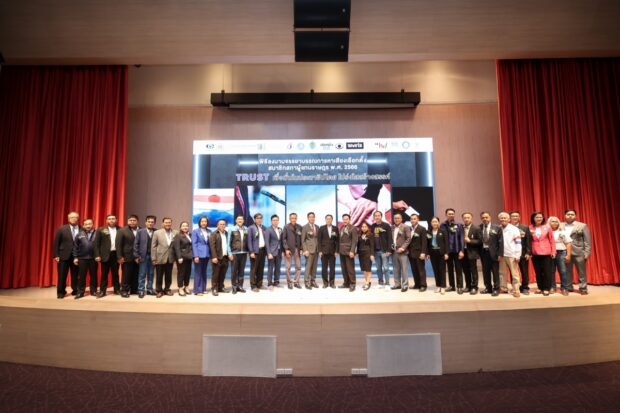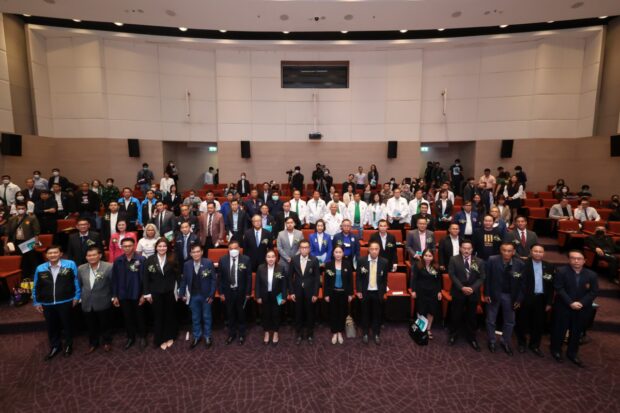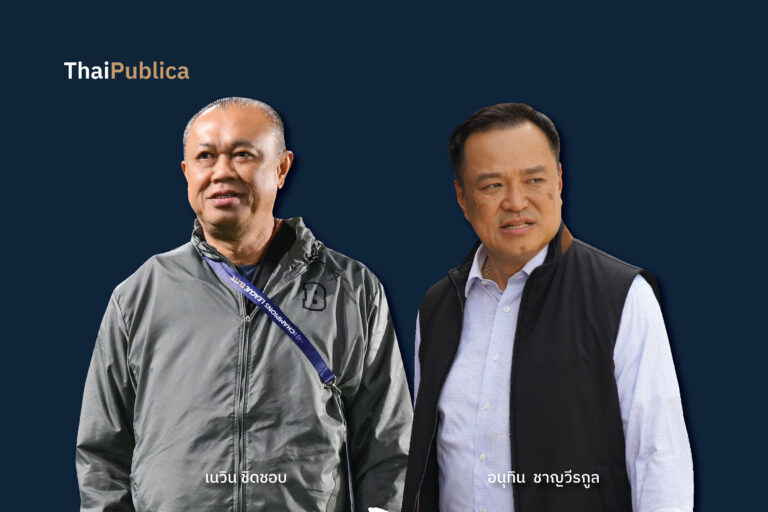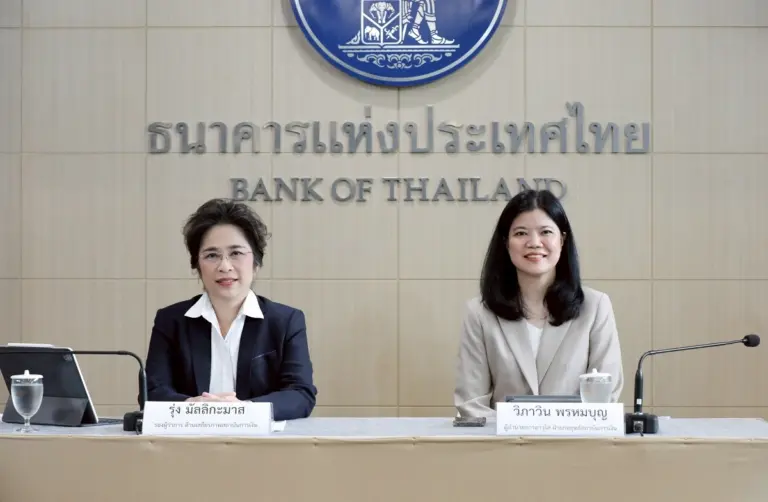พรรคการเมืองร่วมลงนาม “จรรยาบรรณการหาเสียง” และ “สัญญาของพรรคการเมือง” เลือกตั้ง 2566 ปลอดเฟคนิวส์-ไม่ร่วมรัฐบาลเสียงข้างน้อย
เมื่อวันที่ 29 มีนาคม 2566 ผู้แทนพรรคการเมืองร่วมลงนาม “จรรยาบรรณการหาเสียงเลือกตั้ง” และ “สัญญาของพรรคการเมือง” ให้คำมั่นว่าจะเคารพการตัดสินใจของประชาชนในการเลือกตั้งสมาชิกสภาผู้แทนราษฎร 14 พฤษภาคม 2566 รณรงค์หาเสียงอย่างสร้างสรรค์ ใช้สื่อสังคมออนไลน์อย่างมีความรับผิดชอบ ไม่ร่วมจัดตั้งรัฐบาลเสียงข้างน้อย และจะผลักดันการทำประชามติร่างรัฐธรรมนูญฉบับใหม่
แม้ว่าการลงนามในจรรยาบรรณการหาเสียงเลือกตั้งและคำสัญญาของพรรคการเมืองจะเคยเกิดขึ้นมาแล้วในการเลือกตั้งทั่วไปก่อนหน้านี้ แต่ครั้งนี้นับเป็นครั้งแรกที่ครอบคลุมเรื่อง “การใช้สื่อสังคมออนไลน์อย่างมีความรับผิดชอบ” เนื่องจากหลายฝ่ายเห็นตรงกันว่าสื่อสังคมออนไลน์มีบทบาทเพิ่มขึ้นมากในกระบวนการเลือกตั้ง ทั้งยังส่งผลกระทบต่อบรรยากาศทางการเมืองที่จะนำไปสู่การสร้างฉันทามติในสังคม
พิธีลงนามจรรยาบรรณการหาเสียงเลือกตั้งและคำสัญญาของพรรคการเมืองในวันนี้ ร่วมจัดโดยภาคีเพื่อรัฐธรรมนูญประชาธิปไตย มูลนิธิสันติภาพและวัฒนธรรม มูลนิธิองค์กรกลางเพื่อประชาธิปไตย มูลนิธิอาสาสมัครเพื่อสังคม เครือข่ายประชาชนสังเกตการณ์การเลือกตั้งปี 2566 WeWatch WeVis มูลนิธิปรีดี พนมยงค์ และสถาบันปรีดี พนมยงค์ ศูนย์ประสานงานเพื่อการพูดคุยเชิงมนุษยธรรม โครงการผู้หญิงผู้นำทางการเมือง โคแฟค (ประเทศไทย) สภาการสื่อมวลชนแห่งชาติ สมาคมนักข่าวนักหนังสือพิมพ์แห่งประเทศไทย และสภาองค์กรของผู้บริโภค
ในพิธีลงนาม นายธงชาติ รัตนวิชา ที่ปรึกษาพรรคประชาชาติ ในฐานะผู้ที่มีอาวุโสสูงสุดในบรรดาผู้แทนพรรคการเมืองที่ร่วมพิธี ได้รับเลือกให้เป็นผู้นำในการอ่าน “จรรยาบรรณการหาเสียงเลือกตั้งสมาชิกสภาผู้แทนราษฎร พ.ศ. 2566” และ “สัญญาที่พรรคการเมืองขอให้ไว้แก่ประชาชนในโอกาสการเลือกตั้งทั่วไปวันที่ 14 พฤษภาคม 2566” จากนั้นผู้แทนพรรคการเมืองคนอื่นๆ ได้ร่วมอ่านโดยพร้อมเพรียงกัน
สำหรับจรรยาบรรณการหาเสียงเลือกตั้ง มีพรรคการเมืองร่วมลงนามทั้งหมด 30 พรรค เช่น พรรคก้าวไกล พรรคชาติไทยพัฒนา พรรคชาติพัฒนากล้า พรรคไทยภักดี พรรคไทยสร้างไทย พรรคประชาชาติ พรรคประชาธิปัตย์ พรรคเพื่อไทย พรรคภูมิใจไทย พรรคเสรีรวมไทย เป็นต้น ส่วนสัญญาที่พรรคการเมืองขอให้ไว้แก่ประชาชน มีพรรคการเมืองร่วมลงนาม 28 พรรค โดยพรรครวมไทยสร้างชาติและพรรคพลังประชารัฐ ไม่ได้ส่งผู้แทนมาร่วมลงนามในเอกสารทั้ง 2 ฉบับ
ทั้งนี้ องค์กรร่วมจัดยังคงเปิดให้พรรคการเมืองที่ไม่ได้ร่วมพิธีในวันนี้ลงนามในเอกสารทั้ง 2 ฉบับได้เพิ่มเติมจนถึงวันที่ 31 มีนาคม 2566
นายแสวง บุญมี เลขาธิการสำนักงานคณะกรรมการการเลือกตั้ง (กกต.) กล่าวว่า การร่วมลงนามในจรรยาบรรณการหาเสียงเลือกตั้งวันนี้ “เป็นนิมิตหมายอันดีที่แสดงให้เห็นถึงความเห็นพ้องต้องกันของพรรคการเมือง ที่จะทำให้การเลือกตั้งสมาชิกสภาผู้แทนราษฎรเป็นไปโดยสุจริตและเที่ยงธรรม” และเป็นการวางรากฐานของกระบวนการติดตามตรวจสอบการเลือกตั้งโดยภาคประชาสังคม ซึ่งสอดคล้องกับภารกิจของ กกต. ในการส่งเสริมการมีส่วนร่วมทางการเมืองของประชาชน
“กกต. หวังเป็นอย่างยิ่งว่า พรรคการเมืองและว่าที่ผู้ลงสมัครรับเลือกตั้งจะยึดมั่นในจรรยาบรรณการหาเสียงเลือกตั้งสมาชิกสภาผู้แทนราษฎร พ.ศ.2566 ที่ได้ร่วมลงนาม เพื่อร่วมกันสร้างสรรค์ให้การเลือกตั้งเป็นไปโดยสุจริตตามความมุ่งหมายของรัฐธรรมนูญ” นายแสวงกล่าว
รศ.ดร.อนุสรณ์ ธรรมใจ ภาคีเพื่อรัฐธรรมนูญประชาธิปไตยและประธานกรรมการบริหารสถาบันปรีดี พนมยงค์ กล่าวถึงที่มาของเอกสารทั้ง 2 ฉบับว่า เกิดจากการปรึกษาหารือกันหลายครั้งระหว่างผู้แทนพรรคการเมืองกับองค์กรภาคประชาสังคมจนสรุปออกมาเป็นจรรยาบรรณการหาเสียง 5 ข้อ 2 ภาคผนวก และสัญญาของพรรคการเมือง 8 ข้อ ที่ทุกฝ่ายคาดหวังว่าจะเป็นส่วนหนึ่งที่ทำให้การเลือกตั้งและการเมืองในระบอบประชาธิปไตยเข้มแข็ง โปร่งใส และเป็นที่พึ่งของประชาชนได้อย่างแท้จริง
“จรรยาบรรณการหาเสียงเลือกตั้งและสัญญาของพรรคการเมืองในการเลือกตั้ง 2566 จะเป็นหมุดหมายและจุดเริ่มต้นที่ทำให้ประชาชนมีศรัทธาต่อพรรคการเมือง เราจะเปลี่ยนผ่านการเมืองไทยจากระบอบ คสช. (คณะรักษาความสงบแห่งชาติ) ระบอบกึ่งประชาธิปไตยมาเป็นประชาธิปไตยที่สมบูรณ์ยิ่งขึ้นในปีนี้” รศ.ดร.อนุสรณ์กล่าว “หลายคนกังวลว่าในการเลือกตั้งครั้งนี้ เสียงของประชาชนจะไม่มีความหมายเนื่องจากรัฐธรรมนูญให้สมาชิกวุฒิสภา 250 คน มีสิทธิในการออกเสียงเลือกนายกฯ ดังนั้นพรรคการเมืองที่ร่วมลงนามในวันนี้จึงตกลงกันอย่างชัดเจนว่า การจัดตั้งรัฐบาลต้องสะท้อนเสียงส่วนใหญ่ของประชาชนอย่างแท้จริง”
รศ.ดร.อนุสรณ์กล่าวว่า พรรคการเมืองยังให้คำมั่นคำสัญญาด้วยว่า หากได้ร่วมจัดตั้งรัฐบาล จะนำนโยบายของแต่ละพรรคที่ใช้ในการหาเสียงมาบูรณาการอย่างจริงจังเพื่อประโยชน์ของประชาชน และความก้าวหน้าของระบอบประชาธิปไตยอันมีพระมหากษัตริย์เป็นประมุข และจะร่วมมือกับทุกพรรคการเมืองในการทำประชามติเพื่อถามประชาชนว่าเห็นด้วยกับการจัดทำรัฐธรรมนูญฉบับใหม่ที่ร่างโดยสมาชิกสภาร่างรัฐธรรมนูญที่มาจากการเลือกตั้งของประชาชนโดยตรงหรือไม่
จรรยาบรรณ 5 ข้อในการหาเสียงเลือกตั้ง 2566
พรรคการเมืองที่ลงนามในจรรยาบรรณฉบับนี้ ให้คำมั่นสัญญาว่าจะปฏิบัติตามหลักการที่เห็นชอบร่วมกัน 5 ประการ คือ
1) ปฏิบัติตามรัฐธรรมนูญ กฎหมายเลือกตั้ง กฎหมายพรรคการเมือง ระเบียบ ประกาศ และคำสั่ง กกต.
2) ไม่กระทำการที่ทุจริตต่อการเลือกตั้ง ไม่ซื้อเสียง ไม่ใช้กลไกหรือทรัพยากรของรัฐในการหาเสียง
3) หาเสียงอย่างสร้างสรรค์ด้วยสันติวิธี ไม่ใช้ความรุนแรง คำนึงถึงความหลากหลายทางเพศภาวะ ไม่ข่มขู่ คุกคามหรือสร้างความหวาดกลัว ไม่รบกวนการหาเสียงของพรรคการเมืองอื่น
4) ปฏิเสธการปลุกเร้าความเกลียดชังและความรุนแรง การใส่ร้ายผู้อื่นด้วยความเท็จ การใช้ข่าวปลอม การเผยแพร่ข้อมูลด้วยการหลอกลวงเพื่อความได้เปรียบทางการเมือง
5) ธำรงไว้ซึ่งความน่าเชื่อถือของพรรคการเมืองในฐานะสถาบันการเมืองที่สำคัญ นำเสนอนโยบายที่มาจากการมีส่วนร่วมของสมาชิกและประชาชน และรับผิดชอบต่อนโยบายที่เสนอนั้น
นอกจากนี้ผู้แทนพรรคการเมืองยังให้คำมั่นว่าจะปฏิบัติตามแนวทางการหาเสียงเลือกตั้งที่ระบุในภาคผนวก 1 ว่าด้วยการใช้สื่อสังคมออนไลน์อย่างมีความรับผิดชอบ และภาคผนวก 2 ว่าด้วยการหาเสียงที่เป็นมิตรต่อผู้หญิงและบุคคลทุกเพศสภาพ
ภาคผนวก 1 ระบุว่า ในช่วงหาเสียงเลือกตั้ง สื่อสังคมออนไลน์ต้องเป็นพื้นที่ของการสื่อสารที่ปลอดภัย สร้างสรรค์ ดังนั้น0พรรคการเมือง ผู้สมัครรับเลือกตั้ง ตลอดจนผู้สนับสนุนพรรคการเมืองจะต้องไม่กระทำและไม่วางเฉยต่อพฤติกรรมและกลวิธีทางสื่อสังคมออนไลน์ที่เป็นอันตราย ได้แก่ การใช้ข้อมูลบิดเบือน, การลดทอนคุณค่าเชิงอัตลักษณ์, การยั่วยุปลุกปั่นที่มุ่งร้ายให้เกิดความรุนแรงต่อผู้อื่น, การข่มขู่คุกคามและการจงใจรวบรวมและเผยแพร่ข้อมูลส่วนบุคคล, การใช้ปฏิบัติการข้อมูลข่าวสารด้วยการใช้เครือข่ายบัญชีผู้ใช้งาน, การแอบอ้างเป็นบุคคลอื่น, การระดมแจ้งผู้ให้บริการสื่อสังคมออนไลน์ให้ถอดถอนเนื้อหาของผู้อื่น และการใช้วิธีการทางกฎหมายเพื่อวัตถุประสงค์ทางการเมืองแอบแฝง
ภาคผนวก 2 ระบุถึงข้อพึงปฏิบัติในการหาเสียงเลือกตั้งที่คำนึงถึงผู้หญิงและผู้มีความหลากหลายทางเพศ ได้แก่ ส่งเสริมการพัฒนาศักยภาพในการหาเสียงให้แก่ผู้สมัครรับเลือกตั้งหญิง, ไม่ใช้ข้อความหรือวาทกรรมที่ดูถูก เหยียดหยาม หรือลดทอนคุณค่าและศักดิ์ศรีของผู้สมัครรับเลือกตั้งด้วยเหตุแห่งอายุหรือรูปลักษณ์ภายนอกของผู้หญิงและบุคคลทุกเพศสภาพ, ไม่ใช้วิธีการสร้างข่าวลวง ข่าวเท็จ ข้อความที่บิดเบือน แสดงความเกลียดชัง หรือข่มขู่ใช้ความรุนแรงต่อผู้แข่งขันทางการเมือง ไม่ว่าทางกายภาพหรือทางสื่อสังคมออนไลน์
สัญญา 8 ข้อที่พรรคการเมืองให้ไว้แก่ประชาชน
นอกจากจรรยาบรรณการหาเสียงเลือกตั้งแล้ว ผู้แทนพรรคการเมืองยังได้ลงนามใน “สัญญาที่พรรคการเมืองขอให้ไว้แก่ประชาชน ในโอกาสการเลือกตั้งทั่วไป วันที่ 14 พฤษภาคม 2566” ซึ่งมีทั้งหมด 8 ข้อ ได้แก่
- 1) จะเข้าร่วมจัดตั้งรัฐบาลก็ต่อเมื่อมีเสียงสนับสนุนรวมกันเกินกว่ากึ่งหนึ่งของสมาชิกสภาผู้แทนราษฎร โดยไม่ร่วมจัดตั้งรัฐบาลกับกลุ่มของพรรคการเมืองที่มีเสียงรวมกันไม่ถึงกึ่งหนึ่ง
2) เมื่อร่วมกันจัดตั้งรัฐบาล จะนำนโยบายที่แต่ละพรรคใช้ในการหาเสียงมาบูรณาการและดำเนินการ
3) จะร่วมมือกับทุกพรรคการเมืองในการจัดประชามติว่าเห็นด้วยกับการจัดทำรัฐธรรมนูญฉบับใหม่ที่ร่างโดยสมาชิกสภาร่างรัฐธรรมนูญที่มาจากการเลือกตั้งโดยตรงของประชาชนหรือไม่
4) จะสนับสนุนให้กระบวนการพูดคุยสันติภาพในจังหวัดชายแดนภาคใต้เป็นวาระแห่งชาติ
5) จะดำเนินนโยบายการกระจายอำนาจสู่ท้องถิ่น
6) จะส่งเสริมสิทธิมนุษยชนและการรวมกลุ่มของประชาชน ลดความเหลื่อมล้ำในทุกด้าน สนับสนุนให้แรงงานนอกระบบ ลูกจ้างส่วนราชการและลูกจ้างทำงานบ้าน เข้าสู่ระบบการประกันสังคม
7) จะกำกับดูแลไม่ให้สมาชิกที่เป็นข้าราชการการเมืองใช้อำนาจหน้าที่ในทางมิชอบ และให้เคารพความเป็นกลางของข้าราชการประจำ
8) จะสนับสนุนความเท่าเทียมทางเพศ ให้ผู้หญิงและผู้มีความหลากหลายทางเพศได้เป็นผู้นำทางการเมือง ผู้สมัครรับเลือกตั้ง ผู้ดำรงตำแหน่งทางการเมือง และผู้บริหารพรรคการเมืองในสัดส่วนที่เพิ่มขึ้น
ภาคประชาสังคม-สื่อมวลชนเดินหน้าตรวจสอบการหาเสียงและกระบวนการเลือกตั้ง
นอกจากการลงนามจรรยาบรรณการหาเสียงเลือกตั้งและสัญญาของพรรคการเมืองแล้ว อีกหนึ่งความพยายามในการทำให้การเลือกตั้ง 14 พฤษภาคม มีความโปร่งใสและเที่ยงธรรม คือการร่วมมือกันขององค์กรภาคประชาสังคมที่ทำงานด้านการส่งเสริมประชาธิปไตย สิทธิเสรีภาพและองค์กรวิชาชีพสื่อมวลชนในการติดตามตรวจสอบการหาเสียงเลือกตั้ง กระบวนการเลือกตั้ง และข่าวลวงด้านการเมือง
น.ส.ภัสราวลี ธนกิจวิบูลย์ผล ผู้แทนจากเครือข่ายประชาชนสังเกตการณ์การเลือกตั้ง 2566 เชิญชวนประชาชนในทุกเขตการเลือกตั้งร่วมเป็นอาสาสมัครสังเกตการณ์การเลือกตั้ง โดยรายงานเหตุการณ์ความผิดปกติที่พบเห็นในช่วงหาเสียงเลือกตั้งไปจนถึงวันเลือกตั้งมาที่เว็บไซต์ vote62.com
“การเลือกตั้งเป็นกิจกรรมทางการเมืองของคนทุกคน นักการเมืองหรือชนชั้นนำไม่มีความชอบธรรมใดๆ ในการครอบงำหรือบงการการเลือกตั้งให้บิดเบี้ยวไปจากหลักสากล…ยังไม่สายเกินไปที่ประชาชนจะร่วมกันทวงคืนการเลือกตั้งให้กลับสู่ร่องสู่รอยโดยเร็ว” น.ส.ภัสราวลีกล่าว
น.ส.ธนิสรา เรืองเดช จากกลุ่มเทคโนโลยีภาคประชาชน WeVis แสดงความยินดีที่พรรคการเมืองร่วมลงนามเพื่อให้คำมั่นว่าจะปฏิบัติตามจรรยาบรรณการหาเสียงเลือกตั้งและคำสัญญาที่ให้ไว้กับประชาชน ทั้งนี้เอกสารที่ผู้แทนพรรคการเมืองทุกคนได้ลงนามในวันนี้ จะถูกบรรจุเป็นหนึ่งในคำสัญญาของพรรคการเมืองในแพลตฟอร์ม “Promise Tracker” ที่ทางกลุ่มได้พัฒนาขึ้นเพื่อรวบรวมและติดตามการทำตามคำสัญญาและนโยบายของพรรคการเมือง
“พวกเราหวังว่า หลังจากได้รับเลือกตั้งเข้าไปเป็นรัฐบาลแล้ว ทุกพรรคการเมืองจะตอบแทนความไว้วางใจที่ประชาชนมีให้ ด้วยการพยายามผลักดันนโยบายและคำสัญญาที่ให้ไว้ระหว่างการหาเสียง เราจะติดตามการทำงานของทุกพรรคการเมืองและสมาชิกพรรคการเมืองทุกคนอย่างใกล้ชิดต่อไป” น.ส.ธนิสรากล่าว
น.ส.สุภิญญา กลางณรงค์ ผู้ร่วมก่อตั้ง Cofact Thailand เรียกร้องให้พรรคการเมืองหาเสียงและผลักดันนโยบายบนพื้นฐานของข้อเท็จจริง หลีกเลี่ยงการใส่ร้ายป้ายสี การบิดเบือนข้อมูลที่นำไปสู่การเลือกปฏิบัติ การเหยียดเชื้อชาติศาสนา ซึ่งจากการเก็บข้อมูลเบื้องต้นของโคแฟคพบว่า ช่วงที่ผ่านมามีการหาเสียงโดยใช้ข่าวลวงหรือข้อมูลบิดเบือนเพื่อทำให้เกิดความเข้าใจผิด และสร้างความเสียหายต่อคู่แข่งทางการเมือง
“การวิจารณ์คู่แข่งในช่วงหาเสียงเป็นเสรีภาพของพรรคการเมืองที่จะทำได้ แต่อยากขอให้พรรคการเมืองใช้วิธีการสื่อสารเชิงสร้างสรรค์ สร้างแนวร่วมเชิงบวก ไม่ใช้การดิสเครดิตหรือทำลายฝ่ายตรงข้าม บทเรียนจากการเลือกตั้งในฟิลิปปินส์พบว่า พรรคการเมืองที่ได้คะแนนนิยมสูง เป็นพรรคที่ใช้สื่อโซเชียลในเชิงสร้างสรรค์” น.ส.สุภิญญากล่าว และเชิญชวนให้ประชาชนส่งข้อมูลข่าวลวงที่พบมาที่ไลน์ @cofact ซึ่งจะมีทีมงานรวบรวมและตรวจสอบข้อเท็จจริงต่อไป
นอกจากนี้ น.ส.สุภิญญายังเสนอให้สำนักงานคณะกรรมการกิจการกระจายเสียง กิจการโทรทัศน์ และกิจการโทรคมนาคมแห่งชาติ (กสทช.) จัดสรรงบประมาณสนับสนุนภาคพลเมืองและสื่อมวลชนในการรายงานผลการเลือกตั้งแบบเรียลไทม์ ซึ่งเป็นโอกาสอันดีที่ กสทช. จะมีบทบาทในการส่งเสริมประชาธิปไตย
“สำหรับประชาชนผู้รับข่าวสาร ขอให้เช็คก่อนแชร์ทุกครั้ง เพราะทุกครั้งที่เราแชร์ข้อมูล เราอาจสร้างความเกลียดชังหรือความเข้าใจผิดโดยไม่รู้ตัว ในสถานการณ์เช่นนี้ที่อาจจะมีไอโอล้อมรอบตัวเราอยู่ตลอดเวลา เราอาจจะรอให้ภาครัฐหรือสื่อมวลชนตรวจสอบความถูกต้องของข้อมูลข่าวสารไม่ได้ ทุกคนต้องเป็น fact checker เราต้องเป็นคนตรวจสอบข้อมูลก่อนที่จะเชื่อหรือแชร์เสมอ”
……
รายชื่อพรรคการเมืองที่ร่วมลงนามใน “จรรยาบรรณการหาเสียงเลือกตั้งสมาชิกสภาผู้แทนราษฎร พ.ศ. 2566”
ณ วันที่ 29 มี.ค. 66 (เรียงตามลำดับที่ปรากฏในเอกสารลงนาม)
1) พรรคก้าวไกล
2) พรรคชาติรุ่งเรือง
3) พรรคไทยสร้างไทย
4) พรรคเปลี่ยนอนาคต
5) พรรคคนงานไทย
6) พรรคถิ่นกาขาวชาววิไล
7) พรรคประชาไทย
8) พรรคแผ่นดินธรรม
9) พรรคความหวังใหม่
10) พรรคไทยภักดี
11) พรรคประชาชาติ
12) พรรคพลัง
13) พรรคช่วยชาติ
14) พรรคไทยพร้อม
15) พรรคประชาธิปัตย์
16) พรรคพลังธรรมใหม่
17) พรรคชาติพัฒนากล้า
18) พรรคไทยรวมไทย
19) พรรคเป็นธรรม
20) พรรคพลังสังคม
21) พรรคเพื่อชาติ
22) พรรคสังคมประชาธิปไตย
23) พรรคพลังสังคมใหม่
24) พรรคเสมอภาค
25) พรรคเพื่อไทย
26) พรรคเสรีรวมไทย
27) พรรคภูมิใจไทย
28) พรรคชาติไทยพัฒนา
29) พรรคมิติใหม่
30) พรรคแรงงานสร้างชาติ
………….
30 Political parties sign election campaign CoC with focus on responsible use of social media
Bangkok, 29 March 2023—Political parties’ representatives have signed Election Campaign Code of Conduct (CoC) and Political Parties’ Pledges, promising that they would respect voters’ decision in the May 14 general election; use social media responsibly in electioneering; not participate in minority government formation; and push for charter rewrite referendum.
Signing of Election Campaign CoC and Political Parties’ Pledges has occurred in previous general elections. However, this is the first time that the documents cover the issue of “responsible use of social media” as stakeholders agreed that social media has played an increased role in the election process and has significant impact on the political atmosphere.
The event was co-organized by the Association for Democratic Constitution, Peace and Culture Foundation, Thai Volunteer Service, Pridi Banomyong Foundation and Pridi Banomyong Institute, Open Forum for Democracy Foundation (P-NET), People Network for Election Observation, WeWatch, WeVis, Centre for Humanitarian Dialogue (HD), Women’s Political Leadership Programme, CoFact (Thailand), The National Press Council of Thailand, Thai Journalist Association, and Thailand Consumers Council.
In the signing ceremony, Thongchat Rattnavichar, an advisor to Prachachat Party was selected to lead the reading of the CoC and the Pledges as he was the most senior participants. Then, representatives of other political parties joined the reading together.
The Election Campaign CoC was signed by a total of 30 political parties, including Move Forward Party, Chartthaipattana Party, Chartpattanakla Party, Thaipakdee Party, Thai Sang Thai Party, Prachachat Party, Democrat Party, Pheu Thai Party, Bhumjaithai Party, and Thai Liberal Party. Meanwhile, the Political Parties’ Pledges was signed by 28 parties.
The two documents are still opened for signing by political parties until 31 March 2023.
Parties urged to follow CoC
Sawang Boonmee, secretary-general of the Election Commission of Thailand (ECT), said in his opening remark that the signing of the Election Campaign CoC showed that political parties were determined to make this election clean and fair. The event also served as a stepping stone for civil society to take part in electoral monitoring.
“This initiative is in line with the ECT’s mission to promote people’s political participation. Democracy belongs to every citizen in the country, therefore, it’s our duty participate, protect, and make democracy prosper,” Mr.Sawang said.
Mr.Sawang said the ECT acknowledged and participated in this initiative from the beginning. He urged political parties to strictly follow election campaign ethics stipulated in the CoC to uphold the integrity of the election as enshrined in the Constitution.
Anusorn Tamajai, chairman of Pridi Banomyong Institute and member of the Association for Democratic Constitution (ADC), said the two documents were culminated from a series of consultations between political party representatives, civil society organizations, and relevant political stakeholders.
The Election Campaign CoC consists of five-point ethics and two annexes on responsible use of social media and on inclusivity of women and people of all gender diversity. The Political Parties’ Pledges composed of eight pledges.
The two documents, he said, would be crucial parts of strengthening elections and democratic system, making them transparent and truly serve the people.
“The Election Campaign CoC and the Political Parties’ Pledges are a starting point to restore the people’s faith in political parties. We will transform Thai politics from the current semi-democratic regime under the influence of the National Council for Peace and Order (NCPO) to a more complete democracy this year,” said Assoc. Prof. Anusorn.
“Many people are worried that in this election, the voices of the people will not matter because the 2017 Constitution grants the 250 senators’ power to vote for the prime minister. In response to that concerns, political parties that signed today’s agreement have agreed that the formation of the government must truly reflect the majority voice of the people,” he added.
Assoc. Prof. Anusorn said political parties signing the eight-point Pledges also promised that if they if they are able to form a government, they would integrate and implement policies each party proposed during the election campaign. They would also collaborate with every political party in pushing for a referendum to ask the people whether they agree with the drafting of a new constitution by members of the Constitution Drafting Assembly directly elected by the people or not.
Election monitoring launched in full scale
Another effort to make the May 14 election transparent and fair is the collaboration of civil society organizations working on promoting democracy and freedom of expression, as well as media organizations to monitor the election process, the election campaign, and political disinformation.
Patsaravalee Tanakitvibulpon, representative from the People Network for Election Observation, urged people in every constituency to become volunteer observers by reporting any irregularities found during the campaigning period until election day to the network’s website www.vote62.com.
“Elections are a political activity of everyone, politicians or elites have no rights to manipulate or undermine the election…It is not too late for the people to work together to restore the integrity of the election,” said Ms. Patsaravalee.
Thanisara Ruangdej, of WeVis, a platform which aims to promote democracy and empower people through technology and open data, said the group was glad that a number of political parties agreed to sign the Election Campaign CoC and the Pledges
“The CoC and the Pledges signed by political party representatives today will be included in our platform called ‘Promise Tracker’ which was developed by the group to collect and monitor political parties’ promises and policies,” Ms. Thanisara said.
“We hope that after being elected into government, every political party will repay the trust that voters have given them by attempting to push forward policies and promises made during the election campaign. We will continue to closely monitor the work of every political party and its members,” she noted.
Supinya Klangnarong, co-founder of Cofact Thailand, called on political parties to ensure that their election campaigns were based on facts and avoid slanderous labels, distorted information that leads to discriminatory acts against race and religion.
Over the past recent months, Cofact observed some members or supporters of political parties resorted to false news or distorted information to discredit political rivals on social media, she said.
“Political parties have rights to criticize other parties. However, I would like to ask you to consider using positive content rather than using negative rants to discredit or destroy political opponents. Lessons learned from the elections in the Philippines show that the most popular political parties are those that use social media constructively,” said Ms.Supinya.
She encouraged the public to send news and information that were suspicious to be fake, false, or misleading to Cofact’s official Line account @cofact for the team to fact-check or verify.
In addition, Ms. Supinya called on the National Broadcasting and Telecommunications Commission (NBTC) to allocate a budget to support civil society and media in reporting real-time election results.
“This is a good opportunity for the NBTC to play a role in promoting democracy,” she noted.
“For the general public receiving news, please check before sharing. Please be aware that every time we share information, we may create hatred or misunderstandings. There might be a lot of IO members out there in social media, so everyone of us must be a fact checker. We must be the ones to verify the information before believing or sharing it,” Ms. Supinya said.
…….
The political parties, whose signatures appear on this Election Campaign Code of Conduct pledge to respect citizens’ decision made through the voting in a free and fair election, as well as, to abide by the agreed principles for offline campaigning and social media campaigning as follows:
- 1) Respect and comply with the provisions and spirit of the Constitution, the Electoral laws, the Political Parties Act, and the regulations, announcements, orders established by the Election Commission.
2) Refrain from conducting any corrupt practices that construe to vote-buying, including using of state mechanisms or resources for the benefit of the election campaigning or securing votes.
3) Employ constructive, non-violent campaigning methods. Be considerate of gender sensitivity and diversity. Reassure to not obstruct electoral campaigns of other parties.
4) Refrain from using and supporting any practices that incite hatred and violence, or slandering by falsely defaming other’s reputation.
5) Uphold integrity of political parties by formulating policies that are based on inclusive participation of party members and citizens, and being accountable to those policies.
There is consensus about the increasingly important role of social media in the election process, which is impacting the conducive political environment for consensus building in Thailand. Thereby, the signatory political parties of the Code of Conduct for 2023 General Election agree that:
oSocial media must be a safe, constructive, and responsible space where the values of dignity, integrity, and equity are respected.
-The harmful online behaviours and tactics listed in this annex shall not be deployed by political parties, candidates and/or their supporters.
-Parties shall establish preventive and countering measures to address online harms.
Harmful online behaviours and tactics are: disinformation; identity discrimination; dangerous speech and incitement of violence; harassment and doxxing; ‘IOs’ information/influence operations through networks of coordinated accounts; impersonation; organized reporting and takedowns of content; politically-motivated enforcement of legal procedures
Political parties are recommended to follow these practices to make the electoral campaign friendlier to women and every person regardless of gender.
- (1) To encourage electoral campaign methods that focus on policy information, as well as, on communication about the experiences, capabilities, interests, and expertise of the candidates;
(2) To build the capacity of female candidates to conduct their campaign with professionality, confidence and credibility;
(3) To refrain from conveying discriminatory or disparaging message and to avoid asking questions that devalue or dishonour the candidates on the basis of their age, gender, profession, background, ethnicity, religion, belief, or disability;
(4) To avoid such discourse that devalues, or dishonours women and every person regardless of gender, or reduces their rights to take part in politics, as well as, to become political leaders, especially on the basis of their external outlook;
(5) To refuse the use of fake news, false news, distorted statements, hateful speech, or threat of violence against political opponents, either offline campaign or social media campaign.
On the occasion of the general election in 2023, a number of political parties have met to formulate the “Political Parties’ Pledges to the People”, having public interest in mind. The parties who signed the Pledges vow to abide by the following:
- 1) The parties shall join a coalition to form a government if, and only if, they collectively have the support of more than half of the Members of the House of Representatives, and will not join groups of parties that collectively have the support of less than half of the Members of the House.
2) The parties that join a coalition to form a government will make it a priority to integrate their policy platforms on which they based their electoral campaigns.
3) The parties to the Pledges shall seek the cooperation of all other parties to organize a public referendum on the drafting of a new constitution by a Constitution Drafting Assembly (CDA) whose members are directly elected by the people.
4) The parties shall support the Peace Dialogue Process in the Southern Border Provinces to be a national agenda.
5) The parties shall pursue a policy of decentralization of power to Local Administrative Organizations and Community Organizations.
6) The parties shall promote human rights as well as the freedom of association, and reduce all aspects of inequality.
7) The parties shall see to it that their members who have political positions will not improperly exercise their authority to positively or negatively affect candidates in the general election and will respect the neutrality of permanent officials.
8) The parties shall support gender equality and shall in particular support women and those belonging to diverse gender groups to become political leaders, candidates in the general election, political officials, and political party executives in an increasing proportion.









